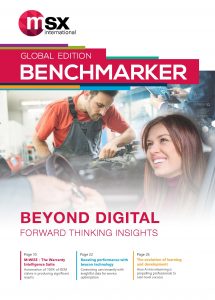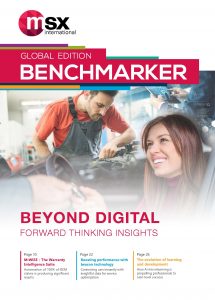It’s time to prepare for the automotive’s digital future
by Pieter Van Rosmalen, MSX VP & Chief Product Officer
The automotive industry is changing so fast that traditional business models no longer fit. Consumer behaviors are dictating a brand-new way of thinking, and manufacturers must adapt quickly if they don’t want to be left behind. But there are plenty of opportunities available to help them sustain revenue from their existing models while breaking into new areas.
Pieter van Rosmalen, Global Vice President, Retail Network Solutions, MSX, explains:
“Today’s manufacturers have little choice but to scrutinize their businesses. Emissions concerns are increasing the demand for electric vehicles. Consumers expect more sophisticated in-car technology, and consumer safety is still the priority. But these are all costly to achieve and profits are suffering.
Until now, automotive companies have leaned heavily on dealerships to sell vehicles. Dealers are set up with the showrooms, infrastructure and training required to provide good customer service. But with profits falling, manufacturers can no longer rely on retail networks alone. They must explore new ways to access and engage with consumers, offering a true customer experience.
Across the business, they must seek new efficiencies, cut operating costs and develop new revenue streams. Business models must become agile, entrepreneurial and dynamic. Manufacturers must support new concepts with the tools to manage and sustain them. And they must acquire the skills and infrastructure to cope with aggressive change.
Smart manufacturers are learning to shift their mentality and are tackling these new opportunities head on. It’s not an easy task but it is one that’s achievable with the right tools and support.
Streamlining warranty and technical processes
Managing warranty is a major cost for manufacturers, and processes can be inefficient, slow and frustrating. But today, organizations are taking advantage of digital solutions built on artificial intelligence and predictive analytics to reduce warranty waste. These technologies use automation and machine learning to flag high-risk claims and ensure they’re handled by the right people for the job. These tools alone can drive down costs by as much as 30%. By digitizing warranty handling and other services such as technical support, manufacturers can see huge cost and efficiency savings while generating the same output.
Branching into new parts markets
Around 50% of a manufacturer’s total profit comes from selling parts. These sales have been seriously affected by the emergence of electric vehicles whose engines are five times more durable and contain fewer parts.
This means manufacturers need to explore other ways of selling parts. Whether it’s through other, local repair chains and online channels, or by working with collision repairers and insurance companies, manufacturers can reach additional markets currently monopolized by competitors to increase genuine parts sales.
Encouraging and supporting retailers
Dealerships face similar pressures to manufacturers in reaching sales targets. But manufacturers can support them more efficiently using tools and services that help them interact more closely with dealer staff. They can introduce learning and development apps to deliver targeted communication to dealer staff. This helps improve sales techniques and provides dealer staff with the information they need to meet the needs of today’s markets. Some solutions even monitor dealers’ progress and financial performance, and help manage improvement programs and change-management schemes.
Facing up to fleet and mobility
Managing fleet repairs is a significant administrative burden for fleet companies, dealers and manufacturers. A manufacturer that sells 600,000 fleet vehicles a year will see 2.4 million cars visiting its dealer network and will generate roughly 5 million invoices. Organizations wanting to strengthen relationships with fleet owners can now offer centralized billing systems which manage the entire process and consolidate the bills of an entire fleet into one. It means 1,000 fleet owners will generate 1,000 invoices per month, not 400,000.
Meanwhile, faced with rising parking costs, congestion charges and environmental concerns, consumers are moving away from traditional car ownership. Mobility models such as leasing schemes have moved into the market, but we can help manufacturers become more agile in this area, with services that scale to meet economic fluctuations or growth.
Engaging and retaining customers
Interactions between consumers and manufacturers have also changed. Traditionally, drivers only approach dealerships to buy vehicles or for services and repairs. But today, manufacturers can build direct relationships with their customers using specialized solutions.
Manufacturers can improve the interaction between connected cars, customers and dealerships. For instance, if a vehicle informs its driver about a mechanical issue, an in-car-beacon can help manage the entire repair process from the online system warning to the repair in the bodyshop.
Many of these tools are transforming the automotive industry, and manufacturers who are making investments now are already seeing the benefits. They are improving partnerships and building stronger relationships with dealer networks. Manufacturers are becoming leaner, more efficient and strengthening their knowledge. And they’re showing long-term commitment to customers, proving they can adapt to and move with industry change.”
Read on for more information about how MSX is helping solve today’s automotive challenges.



